Rejection is inevitable. To live is to face rejection. Whether it’s rejection from a potential employer, from friends or an unreciprocated love. Everyone has to deal with rejection of some sort.
And better yet, the film and TV businesses are a veritable cosmos of rejection. Pitches that crash and burn, pitches received with great enthusiasm – then passed on. Projects picked up then dropped or stuck in development hell. Projects turned down by actors, directors, and studios.
Any rejections, including the writerly kind, can be tough. But it can be especially demoralising and de-motivating when you’re a new writer and you don’t realise how inevitable rejection really is.
Don’t be fooled however, rejection doesn’t get easier the more successful you get. If anything, the more at stake there is, the more pressure.
But enough with the scary talk. The truth is rejection is actually very helpful. When dealt with well, it can be the difference between those who achieve success in their screenwriting careers and those who do not.
We’ve outlined a few tips on how to prepare yourself to deal with rejection before, during and after receiving a rejection.
Table of Contents
- 1. Accept That Rejection Is Part of the Game
- 2. Invite Rejection
- 3. Write Something You’re Really Proud Of
- 4. Be Prepared for Different Types of Rejection
- 5. Give Yourself Some Grieving Time
- 6. Read the Rejection Letter/Email
- 7. Don’t Take It Personally
- 8. Follow up Rejections
- 9. Get Back to Writing
- 10. Join a Screenwriting Group
- Conclusion
- In Summary
1. Accept That Rejection Is Part of the Game
Accepting that rejections are inevitable will help with removing the shock factor. Knowing that others go through it will keep you motivated and at least feeling like you’re on the right track.
“If you’re not prepared to do a lot of pushups, don’t enlist in the Marines. If you’re not prepared to be rejected, don’t try to make films, write films, or direct films, or act in films. Because you’re going to be rejected.”
— Peter Hyams
From Raiders of the Lost Ark and Star Wars to Back to the Future and Home Alone; some of the highest-grossing and ground-breaking films of all time took a while to find their place.
For example, Tarantino had difficulties trying to get any studio interested in his follow-up to Reservoir Dogs. TriStar initially optioned Pulp Fiction only to then do a full 180 by declaring, “This is the worst thing ever written. It makes no sense. Someone’s dead and then they’re alive. It’s too long, violent, and unfilmable.”
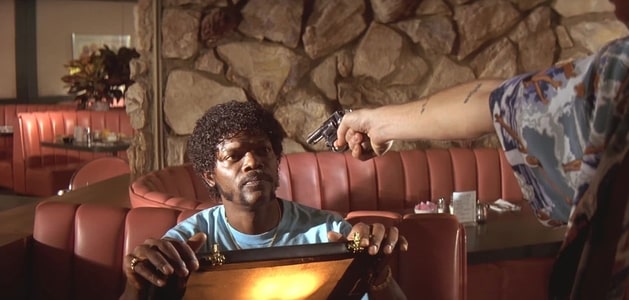
The important thing to remember is that judging a script is subjective. Your work may not fit the criteria of a certain competition. It may not be what a studio is specifically looking for or be suited to a producer’s taste.
But if these anecdotes have taught you anything. It’s that you shouldn’t give up. Not on the 1st hurdle (or even the 100th). All you need is one “yes” to move forward.
Your journey as a screenwriter will be a series of failures and mistakes, triumphs and successes. The process will be long and difficult, but acceptance of rejection will allow you to maintain your patience and respect for the craft whilst you focus on developing your writing.
2. Invite Rejection
Any successful person will tell you the amount of failures they’ve experienced to get to the success they have today. However, many writers still have a specific fear of rejection—to the point where they won’t even share their work.
So why not stare failure down and decide to not be afraid of it? Make it a game and try to collect a hundred rejections.

Although seemingly counter-intuitive, if you put yourself and your work out there more, by the law of averages, you’re bound to get more interest, more success, or at the very least, more feedback.
“I could paper the walls of my bathroom with rejection slips.”
– William Peter Blatty, writer of The Exorcist
Every rejection is a chance to learn. Ultimately it comes down to your point of view about it.
You may see not selling your script as a failure, but what if it became a solid writing sample that got you a screenwriting assignment job? How would that original “failure” look to you now?
So invite rejection in. And with every one, you will feel less and less affected by it personally. You will feel less like your words aren’t important, less doubtful of your own worth or talent.
Don’t let your fear of rejection stop you from pursuing what you love. Strengthening how you deal with rejection with strengthen you on the road to your screenwriting goals.
3. Write Something You’re Really Proud Of
How you deal with rejection also depends on the work you make.
A lot of screenwriters fall into the trap of cutting corners and submitting or sending their scripts too early. When their screenplay gets rejected their feelings are rooted in comparisons.
This means implying your failure is due to someone else either by saying “my screenplay should’ve made it through, it was better” or “I didn’t get through because someone else’s was better”.
This bitterness in your rejection is an unnecessary layer to add to the already difficult situation.
“Write something so brilliant that nobody could ever reject it.”
– Neil Gaiman
But the good news is, this is the part you have control over. How well you make your script in the first place will determine how you handle the rejections.
When you are truly happy with what you’ve produced it’s a lot easier to say “they didn’t like it but I do” or “they didn’t want it but I know it has value anyway”.
It’s better to have the discomfort and disappointment of having something that you absolutely know is on the money be rejected, than dealing with the uglier shade of it because you didn’t do everything that you could.

Rocky, from zero to hero story:
Take Sylvester Stallone’s Rocky for example. It is reported that Rocky received a rejection fifteen hundred times (yes 1,500) prior to it getting greenlit. That makes the rejection rate 99.9%.
Stallone believed in his script and in himself. His faith in his screenplay was unshakable (despite being broke and homeless).
So believe in your writing. Believe in its importance and value.
It doesn’t mean there are no mistakes or areas to fix. But belief in your screenplay will allow you to feel a certain level of peace when you do get rejected and it will encourage you to stay motivated with each rejection.
4. Be Prepared for Different Types of Rejection
You’re going to have to deal with rejection a lot. Some of the rejection will be kind, and some of it downright mean spirited.
Some of it will come from executives, some of it will come from readers, and believe it or not, a lot of it will come from yourself. As you internalize the opinions of others, you’ll start to beat yourself up.
However, being aware of the different types of rejections you may encounter will allow you to prepare yourself. From a non-answer or a standard rejection letter to requests for other work. Rejections can look a myriad of ways.
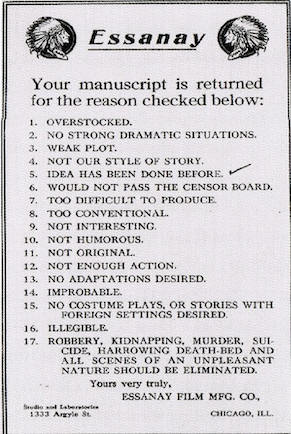
Different types of rejection a screenwriter may face:
- The Standard Rejection: A rejection with no feedback or thoughts. Usually sent out to say thank you for sending your work but the work is not a fit for the studio or the agent can’t represent you at this time.
- The Informed Rejection: This rejection is more personalised. It suggests that someone has read your script all the way through. It will include details from your story or your characters. If you’re lucky, the letter will also suggest possible revisions.
- The Signed Rejection: The most rare and desirable of all the types of rejection letters. This is usually from the agent or executive themselves. In the best scenarios, the agent will ask you to send other work their way.
As you can see, there are several types of rejections you could receive. Usually the more personal the rejection, the more time the agent or editor spent with your work and the more potential and talent they see.
5. Give Yourself Some Grieving Time
The first thing to do when you receive your rejection letter is to give yourself some time to grieve.
Whether you just received your first writing rejection or your hundredth, suppressing feelings will only strengthen the feeling itself. So allow yourself to feel it cleanly, without added guilt or pressure.
You choose how long your grieving will be, but don’t let it go on forever. Many screenwriters allow themselves 24 or 48 hours of sadness and grief to pass before they move on from rejection.
So allow yourself to feel it cleanly, without added guilt or pressure.
Maybe even use this time to take a break from writing for a few days. Go for a hike or take a break away somewhere if possible. If you’re inclined to get defensive or even aggressive after receiving rejections, possibly retreat somewhere without service or WiFi!
The point is to get a change of scenery. Doing something completely different can help you come back with a renewed sense of your writer’s self.

Inevitably, your sadness will continue outside your grieving period. You’ll continue to feel pain, anger, or self-doubt after receiving a rejection but don’t feel guilty. Your feelings are normal!
To deal with rejection as a writer is challenging. So giving yourself permission to feel whatever you’re feeling at any point at least makes this process a healthy one.
Remember, it’s how you deal with rejection that differentiates those who are successful and those who are not.
6. Read the Rejection Letter/Email
The next best thing to do in order to deal with rejection is to look at the rejection letter itself. With practice, you will be able to decipher the standardised and overused phrases to find the information worth listening to.
What’s important to remember is that script editors, executives and agents are the masters of understatement. A lot can be carried within a simple sentence.
Most of the time you will be building your own dictionary of recycled phrases found in each rejection. With time you will be able to quickly sort through the feedback and know which ones to take on board and which to ignore.
It’s also important to be able to differentiate between constructive and destructive criticisms.
Destructive Criticisms:
Destructive criticisms are those aimed at you and not your work. Criticisms including “you write like a child” that are more personal or even blanket statements about your script, you can simply ignore.
Those types of mean-spirited comments say much more about the person giving the feedback than the person they’re directed at. Plus, these criticisms can’t help you develop your craft.
Constructive Criticisms:
However, others may offer some constructive feedback and give you a very clear indication of why your script was rejected in the first place. This kind of script coverage is absolutely invaluable.
“Every rejection is incremental payment on your dues that in some way will be translated back into your work.”
— James Lee Burke
This is an important part of rejection. You can choose to take that rejection, criticism, and failure and turn it into information that will help you write better, more successful screenplays.
So take time to read through it and explore the areas that the feedback is aimed at. Identify whether the area seriously needs improving. If it does, try to fix it at the earliest.
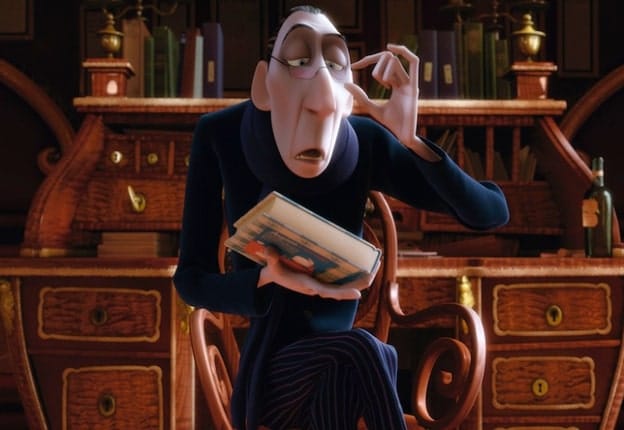
Remember, constructive criticisms will always have actionable suggestions that you can use to improve your work. Be open to accepting such criticism, and try to use it in a productive way to get better.
This business is not for the thin of skin or huge egos—the machine will eat you up and spit you out—it’s for those who are willing to collaborate, learn, and compromise. That tenacity and willingness to give and take will help you become a better screenwriter.
7. Don’t Take It Personally
We get it. After you’ve spent months, or even years, writing a screenplay, it feels very personal.
You’ve shunned family and friends, sequestered yourself in front of a computer screen for hours on end. You’ve painstakingly created characters that you’ve grown to love or loathe. Everything is real to you – every single detail. It’s all personal.
But all that dedication is nothing out of the ordinary and the truth is, your screenplay is nothing more than an object in the eyes of everyone else.
So even though rejection as a writer hurts don’t take it personally. It’s not you they are rejecting, it’s your current project.
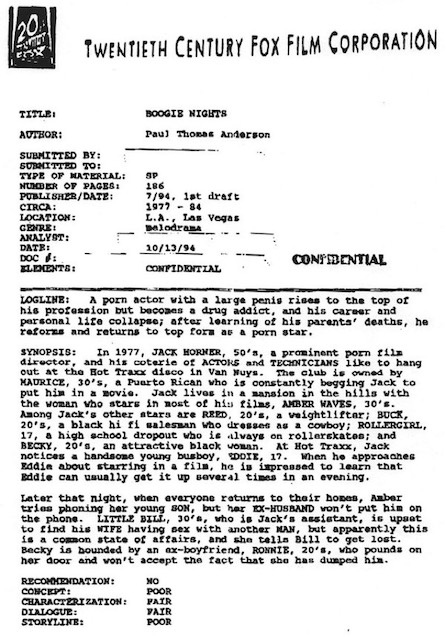
This piece of advice is much easier said than done, but try to adopt the mindset of ‘the studio is not rejecting me, they are rejecting my work’. When your work is rejected, and not you, then you can take steps to improve your writing.
A rejection isn’t telling you to quit writing – it’s telling you, honestly, to try again – somewhere else or with something else.
“I take rejection as someone blowing a bugle in my ear to wake me up and get going, rather than retreat.”
— Sylvester Stallone
And remember, take a deep breath and don’t write an angry reply. Being defensive or aggressive about your work is like signing a contract guaranteeing you will never work for that company.
8. Follow up Rejections
This is a step that many writers forget. But it is a great coping mechanism because if you’re polite and thank them for their time, people will remember you.
By all means, never try to justify yourself and tell them why they are wrong. Never.
If they open up a dialogue then, of course, accept that. You can have very interesting conversations where an agent or producer says “well I don’t think this scene works because of blah, what do you think”. You can get into a polite dialogue where you gain more personalised feedback.
Hardly anyone responds to rejections but it is the best way to create a relationship.
If they don’t open up a dialogue, then reply by thanking them for their feedback – if they’ve given you any. Or for their consideration if they’ve given you no feedback.
And then if you happen to have another script ready, you can write back to them asking whether they would be interested. You wouldn’t believe how many people write back interested in reading it. It’s something important to catch onto.
If you don’t happen to have a script at the time of the rejection you can still write them again when you do. They might say no to reading your script but it will surprise you how many say yes.

Hardly anyone responds to rejections but it is the best way to create a relationship. Not only that but you will feel better about your work.
Plus, a lot of times those reading your scripts are interns, work experience people, script readers. These are all the people of tomorrow. If you make them feel valued, then they will more likely remember you and respond.
9. Get Back to Writing
The hardest part of rejection is when you don’t get any feedback at all. This is why Hollywood can be really harsh. So when you don’t get any constructive feedback you just have to move on.
Expose or submit your work to other people. Maybe even work on another project. Your commitment to writing and to getting better is the best way to deal with rejection.
Getting back to writing is sometimes the only way to remind yourself why you love writing in the first place. Heck maybe even dedicate some time to sit down and write yourself a letter. An ode to writing.

Explain why you love writing. When did you exactly fall in love with screenwriting? What writer inspired you to write and why? How do you feel when you write?
Let your love for writing pour out onto this page. You will feel better not only because you will be reminded that writing is your purpose but it will shift your focus from the temporary sting of rejections to the lifelong passion for storytelling.
Because this is what you are built for. Go back and be a writer
10. Join a Screenwriting Group
Screenwriting groups can offer a lot of support and encouragement during the screenwriting process and in this case, through rejections.
Talking to people who have or are going through what you are is a sure way to feel better about yourself. And learning how other writers deal with rejection can be a helpful balm in itself. It’s good to feel that you are not alone.
- A screenwriting group can provide a safe place to work through the pain and frustration.
- This is a community where it’s acceptable to cry, scream and freak out about how you’ll pay this month’s rent.
- Wail at the powers that be. Together. Curse. Together. Maybe even throw a pity party.
A certain degree of cynicism is helpful too. Laughing at the extremes of the movie business can be an effective defence mechanism.
Not only can you share in the pain of rejection but you will be able to get helpful feedback from your writer friends. This is especially important if your rejections are empty and leave you feeling lost.
And on the flip side, it’s also a great place to celebrate and cheer on the small victories. Don’t belittle your successes. However scarce they are, or little they seem, they should be celebrated.
If you don’t already have a network of writers, you can start to build your contacts by being active at competitions or joining online screenwriter communities.

Conclusion
There is no escaping rejection or failure. The times when you fail are tests to see if you really have what it takes to weather the long slog of establishing a career as a working screenwriter.
Much like the development of a screenplay, you as a writer will also develop through each failure. Through each rejection, you will discover yourself as a screenwriter—exploring your strengths, weaknesses, and your style.
Failure and success are the Yin and Yang of any artistic journey. We can only cherish the hard work it takes to achieve success because we’ve been able to take the punches and body blows that failure delivers.
So accept it, embrace it, learn from it. And remember, you earned that rejection. You took all the steps along the way, finished a script and found the courage to send it out there.
Just keep going. Get better. Raise your craft. Learning how to deal with rejection should be seen as a companion to learning screenwriting as a craft in general. And as hard as it is, the more you do it the better you will get at it.
In Summary
Rejection is inevitable. In fact, it’s a strong guarantee. And for screenwriters, it’s to be expected more often than not. Producers say “no” all the time, rejecting at least a thousand pieces of material for every one they pursue. It’s just business.
To deal with rejection you need to accept rejection, embrace it and learn from it. You earned that rejection, you finished the script and you found the courage to send it out there. Appreciate your accomplishments and put your energy into moving forward rather than dwelling on the past.
The best ways to deal with rejection are all to do with coming to terms with rejection as inevitable and accepting that it’s not personal. Rejection of a particular script does not mean rejection of you personally or you as a writer. Treat rejection as a difficult roadblock but one that it’s always possible to bounce back from.
– Got a great script? Enter our TITAN Screenwriting Contest.
– What did you think of this article? Share It, Like It, give it a rating, and let us know your thoughts in the comments box further down…
– Struggling with a script or book? Story analysis is what we do, all day, every day… check out our range of script coverage services for writers & filmmakers.
This article was written by Mariona Foguet-Gonzalez and edited by IS Staff.
Get *ALL* our FREE Resources
Tackle the trickiest areas of screenwriting with our exclusive eBooks. Get all our FREE resources when you join 60,000 filmmakers on our mailing list!

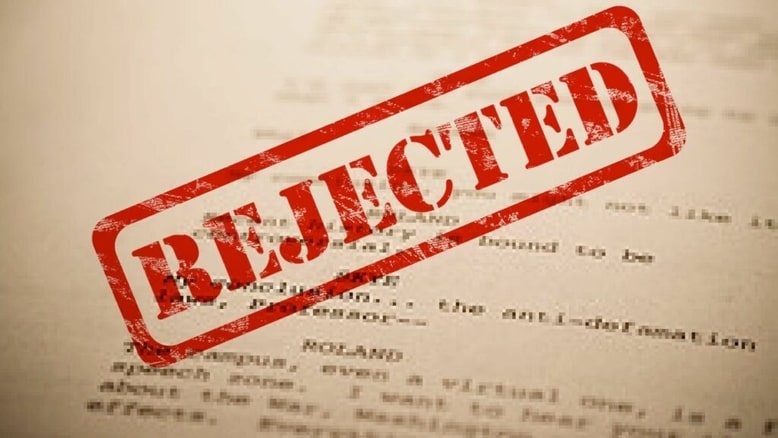
Really enjoyable and constructive article. Nothing wrong with a good pity party! Thank you – please put out some more features like this!